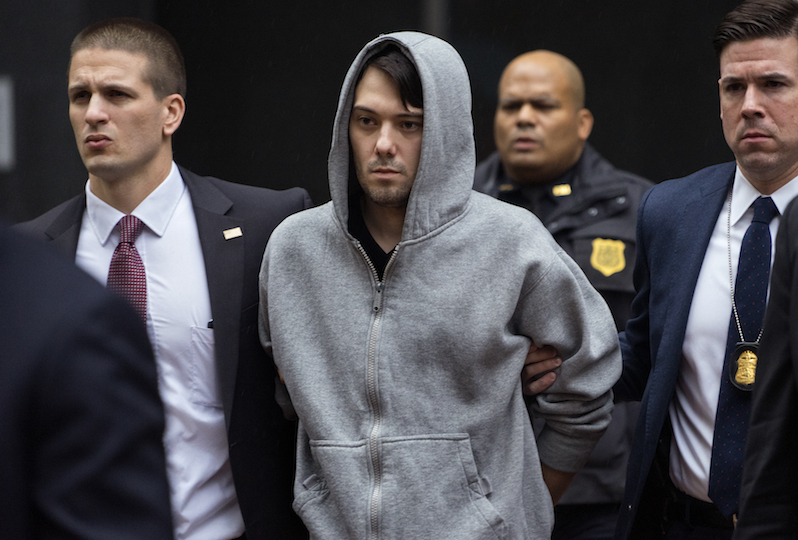VIDEO: ‘Pharma Bro’ and Hedge Fund Profiteer Martin Shkreli Arrested in Fraud Case
The 32-year-old Turing Pharmaceuticals CEO and Wall Street player became a source of schadenfreude on a mass scale Thursday with the news that he had been arrested for securities fraud. Martin Shkreli is escorted by law enforcement agents in New York City after being taken into custody following a securities probe. (Craig Ruttle / AP)
Martin Shkreli is escorted by law enforcement agents in New York City after being taken into custody following a securities probe. (Craig Ruttle / AP)
Martin Shkreli is escorted by law enforcement agents in New York City after being taken into custody following a securities probe. (Craig Ruttle / AP)
Turing Pharmaceuticals CEO and former hedge fund manager Martin Shkreli shot to infamy in recent months amid the outcry that his drug-pricing strategies essentially amounted to price-gouging. On Thursday, the 32-year-old Wall Street player became the subject of schadenfreude on a mass scale with the news that he had been arrested for securities fraud.
Shkreli’s legal woes stemmed from hedge fund work he did prior to taking on his current position. And as The Washington Post reported, we’re apparently looking at another high-stakes Ponzi scheme in this case:
Federal prosecutors alleged that for five years, Shkreli lied to investors in two hedge funds and bio-pharmaceutical company Retrophin, all of which he founded. After losing money on stock bets he made through one hedge fund, Shkreli allegedly started another and used his new investors’ money to pay off those who had lost money on the first fund. Then, as pressure was building, Shkreli started Retrophin, which was publicly traded, and used cash and stock from that company to settle with other disgruntled investors, prosecutors contended.
Shkreli “engaged in multiple schemes to ensnare investors through a web of lies and deceit,” U.S. Attorney Robert L. Capers told reporters. “His plots were matched only by efforts to conceal the fraud, which led him to operate his companies … as a Ponzi scheme.”
At his arraignment Thursday afternoon, Shkreli pleaded not guilty. He was released on $5 million bond. Turing and Shkreli’s attorneys did not return emails and calls seeking comment.
Evan Greebel, former outside counsel to Retrophin, was also arrested and has been charged with helping Shkreli with his fraudulent schemes.
Before Shrkeli’s army of online foes gets too excited, though, here’s The Guardian‘s Chris Lehmann with some sobering points about how, if recent history is any indication, Shkreli’s punishment isn’t likely to reach a level consummate with his alleged crimes:
Like a millennial Bernie Madoff, Martin Shkreli almost has to kite fraudulent stock deals and other dubious means of profit maximization to stave off the aggrieved corps of ground-floor investors he’s accused of initially misleading and defrauding.
But this is where a much longer-running, far sicker joke is poised to kick in – the one known as federal criminal prosecution of large-scale financial malefactors. For all the short-term tabloid attention that Shkreli’s prosecution is likely to garner, the odds against a truly satisfying, Madoff-style turn in the hoosegow for our boy CEO are steep.
That’s because the legal pursuit of financial titans is notoriously compromised and corrupt. University of Virginia law professor Brandon L Garrett conducted an exhaustive study of more than 2,000 criminal prosecutions of business organizations from 2000 to 2012, and published the results in his recent eloquently titled book Too Big to Jail.
Less than half of the 273 publicly traded firms facing criminal charges went through the motions of an actual trial, Garrett found; the remaining 54% of such companies either entered into cushy “deferred prosecution” deals – generous, laxly enforced agreements to improve the “culture” of criminal malfeasance at the wayward firm in question – or simply skirted prosecution altogether.
At any rate, here’s video footage of Shkreli’s arrest, courtesy of MSNBC (via YouTube):
–Posted by Kasia Anderson
Your support matters…Independent journalism is under threat and overshadowed by heavily funded mainstream media.
You can help level the playing field. Become a member.
Your tax-deductible contribution keeps us digging beneath the headlines to give you thought-provoking, investigative reporting and analysis that unearths what's really happening- without compromise.
Give today to support our courageous, independent journalists.


